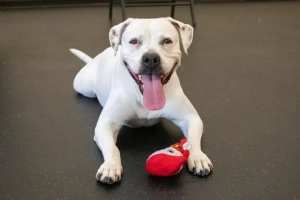No chocolate, ever, for pets; try green beans, carrots or plain yogurt for dog snacks

Five-year-old Lady (A506559) is a total lovebug. She loves playing with toys and getting attention from everyone who visits. Lady’s favorite people foods are chicken and fish, but has been known to eat a carrot or two if the mood strikes her. Lady is available for adoption at Pasadena Humane, so if you’re a foodie looking for a foodie canine companion, check out Lady!
One of my favorite food groups is chocolate. When February rolls around, my mouth waters in anticipation of the Valentine’s feast. While I haven’t met many chocolates I didn’t love (no chocolate-covered cherries for me, please), my favorites are dark chocolate covered caramels topped with sea salt.
I’ve recently started dabbling in serious gourmet chocolate bars. Our city now boasts its own made-in-Pasadena artisanal chocolate “manufactory” and café on Colorado Boulevard. I highly recommend CAR Artisan Chocolate, and if you go there, be sure to try the croissants, too.
You may be wondering what this has to do with pets, and of course, the tie in is that chocolate is incredibly toxic for dogs and cats. While I think this must be one of the saddest things about not being human, it’s important to note that not all human food is bad for your pets.
Some of our foods can even be healthy for our pets. One of my dog Sueshi’s favorite foods is green beans. Other healthy human food snacks for dogs include raw and cooked carrots, plain yogurt, blueberries, pumpkin, xylitol-free peanut butter and eggs. Your cat might enjoy a piece of spinach, banana or cantaloupe.
Many pet parents opt to cook well-balanced meals for their pets. Home cooked, unseasoned meats and fish like chicken and salmon are okay in moderation for dogs and cats. Many dog parents will know the classic upset tummy recipe of boiled chicken breast with white rice.
My dog Sueshi is on a special low-protein diet because of kidney issues, so I always recommend checking with your veterinarian before making changes or introducing new foods.
In addition to chocolate, many other foods we humans love are toxic to our pets. Most nuts are dangerous for dogs and cats, especially macadamia nuts, black walnuts, pistachios and raw cashews.
Basic meal starters like onions and garlic are poisonous to dogs and cats. So are some healthy foods like raisins, grapes and avocados.
While offering your pet a tasty morsel off your plate may be tempting, not only is eating table scraps potentially poisonous to your pets, it can also contribute to weight gain and obesity.
VCA Animal Hospitals estimates that 25-30% of the general canine population is obese and that upwards of 40% of adult dogs are overweight. While a few extra calories here or there may not seem like a lot, keeping your dog on a regimented diet is important.
Pets have a different digestive system than ours. The human diet can be quite rich and fatty, leading to gastrointestinal upset and pancreatitis among dogs and cats. Human meals also tend to be high in sodium which can be dangerous for our pets.
If you find it hard to resist your pet’s demands at the dinner table, remember that begging is a learned behavior. That means your dog has learned that when they beg, they are rewarded with what they want — your food!
The best way to get them to stop begging is to ignore them. It may take some time, but you will be able enjoy meals in peace before long.
A final word of caution, if you’re planning on accompanying your chocolate with adult refreshments, remember that pets should never be allowed alcohol. The same goes for soda, coffee and tea, which have harmful levels of caffeine.
At Pasadena Humane we offer a variety of healthy, nutritional pet foods in our Shelter Shop. So, after you pick up your chocolate and croissants on Colorado Boulevard, swing by to see us at the corner of Raymond Avenue and Del Mar Boulevard for some safe, healthy treats for your pets.
Dia DuVernet is president and CEO of Pasadena Humane.
This blog post originally appeared as a column in the Pasadena Star-News on February 2, 2023.


